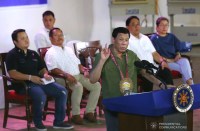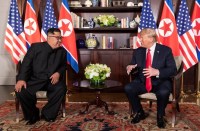Culture is always the most effective way to bridge national divides and help connect people across the world. For most people, this means sharing music, video clips, memes and jokes online, but for one Filipino guitar player it meant much more.
Jared Dines is an American multi-instrumentalist (known primarily for his guitar playing) who in addition to playing in multiple bands is a Youtube star. His videos are known for their sense of humour, while they also give Dines a chance to show off his heavy mental musical gymnastics.
Recently, Dines got a message from a Filipino fan and guitarist called Kirk. Kirk made Dines a proposition that if he could get one of Dines’s posts 5,000 shares on Facebook, Dines would send him one of his cherished guitars. Thinking that there’s no way that Kirk could get 5,000 shares, he accepted the challenge.
Of course, Filipinos are among the most active social media users in the world and slowly but surely, Kirk got the 5,000 shares and Dines proceeded to look for which one of his many guitars to ship to The Philippines.
Dines found the guitar he’d choose to send over, but then things hit a brick wall. Not only was shipping the guitar to The Philippines far more expensive than Dines originally realised, but the customs duty that Kirk would have to pay would be so expensive that it would have made the whole idea of a “free guitar” appear rather pointless.
Not ready to give up on his promise, Dines contacted the guitar string company Ernie Ball to see how to effectively send Kirk a guitar. After a few phone calls and emails, Ernie Ball agreed to fulfil Dines’s promise and send Kirk one of their new guitars.
The story ends with Dines reacting live to a video that Kirk made showing off his new guitar.
This story proves several things. First of all, it shows that in the 21st century, music remains an important factor in connecting strangers across countries and across continents.
Secondly, while many think of free trade vs. protectionism as a subject that is only of interest to major businesses, it actually effects ordinary people just as much as anything else. If The Philippines and the US already had a free trade agreement (FTA), not only would there have been no questions about Kirk needing to pay an import duty (a tax) on one of Dines’s guitars, but shipping costs would be lower too as countries with existing FTAs tend to be prioritised by shipping companies who realise that they will need to handle more goods travelling between the two free trading countries in question.
This does not mean that shipping a guitar from the USA to The Philippines will ever be “cheap” when done on an individual basis, but it could have been far more cost effective if there was a fully fledged free trading agreement in place.
Of course, all was well that ended well for Jared Dines and his Filipino fan Kirk, but the troubles the former ran into when seeking to gift one of his guitars to one of his fans overseas demonstrates how economic protectionism is both a financial and cultural wall that keeps people from connecting not only in business but also when it comes to people-to-people connectivity.
The moral of this story is that free trade helps make the world a smaller and ultimately a better place.




